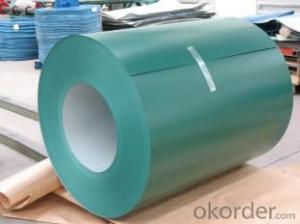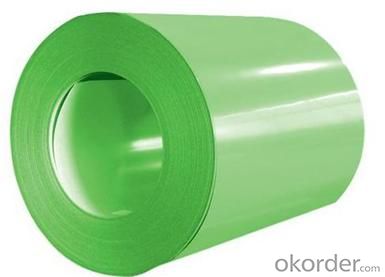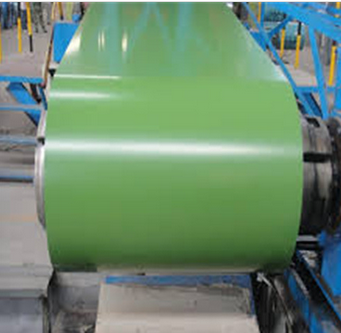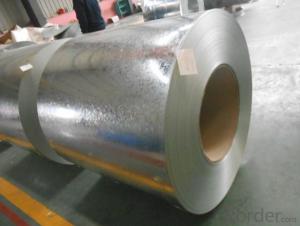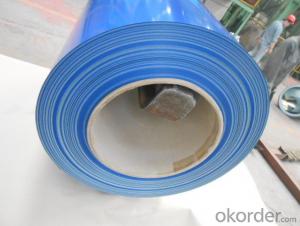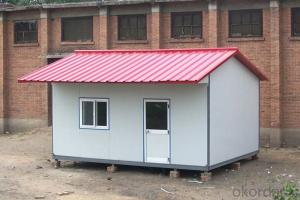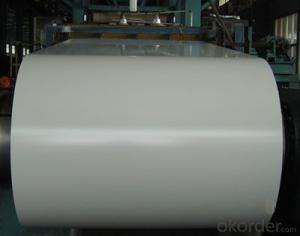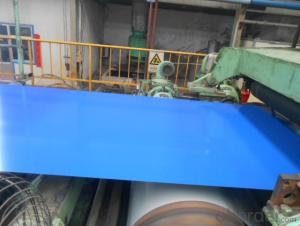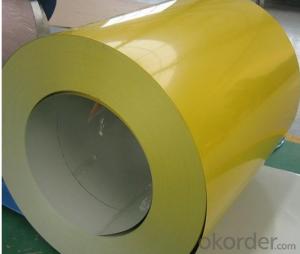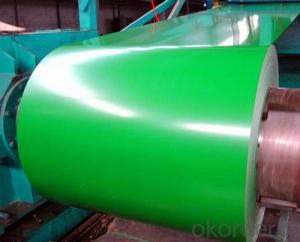PPGI,Pre-Painted Steel Coil Prime Quality in Green Color
- Loading Port:
- Shanghai
- Payment Terms:
- TT OR LC
- Min Order Qty:
- 200 m.t.
- Supply Capability:
- 20000 m.t./month
OKorder Service Pledge
OKorder Financial Service
You Might Also Like
1.Structure of Pre-painted Galvanized/Aluzinc Steel Coil Description
With GI (aluzinc) as base metal, after pretreatment (degrease and chemical treatment) and liquid dope with several layers of color, then after firing and cooling, finally the plate steel is called pre-painted galvanized (aluzinc) steel. Pre-painted galvanized steel is good capable of decoration, molding, corrosion resistance. It generally displays workability, durability and weather resistance.
2.Main Features of the Pre-painted Galvanized/Aluzinc Steel Coil
• Excellent corrosion resistance
• Excellent weather resistance
• Capability of decoration, molding, corrosion resistance
• Workability, durability
• Excellent heat resistance performance
• High strength
• Good formability
• Good visual effect
3.Pre-painted Galvanized/Aluzinc Steel Coil Images
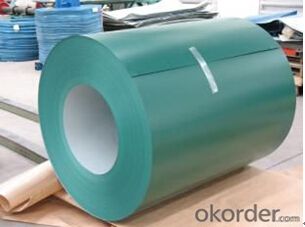
4.Pre-painted Galvanized/Aluzinc Steel Coil Specification
Quality standar: JIS G3312 CGCC & CGLCC
Hardness of P: Both soft and hard quality are available
Surface finish: with or without protect film
Thickness : 0.14-1.20 mm
Width : 914mm, 1000mm, 1220mm and 1250mm, thickness 600-1250mm is available
Finish by coil or sheet: Both sheet and coil are available
8Zinc coating: 60-275G/M2, both sides
Paint thickness for top side : 5 micron primer + (10-20) microns modified polyester, green color.
Paint thickness for back side: (5-10) microns Epoxy
Weight per coil: 4-6 tons, also can be upon customer's requirements
Max loading weight in one 20ft container : 25 tons generally
5. FAQ of Pre-painted Galvanized/Aluzinc Steel Coil
We have organized several common questions for our clients,may help you sincerely:
1. What is the minimum order quantity ?
Our MOQ is 50mt for each size. And we will consider to give more discount if you make big order like 1000 tons and more. Further more, the more appropriate payment term your offer the better price we can provide.
2. How long can we receive the product after purchase?
Usually within thirty working days after receiving buyer’s advance payment or LC. We will arrange the factory manufacturing as soon as possible. The cargo readiness usually takes 15-25 days, but the shipment will depend on the vessel situation.
3. How to guarantee the quality of the products?
We have established the international advanced quality management system,every link from raw material to final product we have strict quality test;We resolutely put an end to unqualified products flowing into the market. At the same time, we will provide necessary follow-up service assurance.
- Q: What are the different types of steel coil grades and specifications?
- In the market, one can find a variety of steel coil grades and specifications. These grades and specifications cater to different industry needs and applications. Several commonly used types include: 1. Hot Rolled Steel Coils: These coils are manufactured by heating the steel above its recrystallization temperature and then rolling it at a high temperature. They are often used in applications where dimensional accuracy and surface finish are not crucial. 2. Cold Rolled Steel Coils: Cold rolled steel coils are produced by subjecting hot rolled coils to further processing in cold reduction mills. This process enhances surface finish, tightens tolerances, and increases strength compared to hot rolled coils. They find wide applications in the automotive, construction, and electrical industries. 3. Galvanized Steel Coils: These coils are coated with a layer of zinc to protect them from corrosion. Galvanization improves the durability and longevity of the steel coils. They are commonly used in roofing, fencing, and automotive body parts. 4. Stainless Steel Coils: Made from a combination of iron, chromium, and other elements, stainless steel coils offer excellent corrosion resistance and high strength. They are widely used in industries such as food processing, chemical, and medical, where hygiene and corrosion resistance are critical. 5. High-strength Low-alloy (HSLA) Steel Coils: HSLA steel coils are designed to possess higher strength and improved formability compared to conventional carbon steels. They are commonly employed in structural and transportation applications where weight reduction and high strength are required. 6. Electrical Steel Coils: Also known as silicon steel or transformer steel, these coils are specifically designed for electrical equipment like transformers, motors, and generators. They exhibit low core losses and high magnetic permeability, ensuring efficient energy transfer. 7. Tool Steel Coils: Tool steel coils are specially formulated to possess high hardness, wear resistance, and toughness. They are commonly used in the production of cutting tools, dies, and molds. These examples represent only a fraction of the steel coil grades and specifications available in the market. The choice of the appropriate grade and specification depends on specific application requirements, such as strength, corrosion resistance, formability, and surface finish.
- Q: How are steel coils recycled?
- Steel coils can be recycled through a process that involves melting them down in a furnace, removing impurities, and then shaping the molten steel into new coils or other steel products. This recycling method helps conserve resources, reduce waste, and significantly cut down on energy consumption compared to producing steel from raw materials.
- Q: I want to purchase steel for construction purpose, What aspects should I keep in mind while deciding that which company should I contact for this?
- It has been a few years since I was in the business but I have found that some steel from some countries can be quite different from the standards steel made in the US. For instance, one in 5 of my Indian made cast iron fittings would break when tightening it down. This never happened with US fittings. Even though I could take it back and get a refund, the increased price of US made materials was worth the savings in time and trouble. On a job in Columbia, the 3 inch angle iron came to us in 4 different sizes, all around three inches but not quite. This is not to say that all foreign metal is bad. One RD project I headed up we found a foreign bearing steel to be far superior to anything we could get in the states.
- Q: how is stainless steel made? what are the things used in making it?
- There are different recipes, and different types of steel are made for different purposes. They all share high temperatures, which allows extra carbon to bind with the iron. This is the main thing that makes steel stainless, or rustproof. Other metals such as chromium, molybdenum, magnesium etc. are often added to increase tensile (twisting) strength, flexibility, etc.
- Q: What are the common certifications required for steel coils?
- The common certifications required for steel coils depend on the specific industry and application of the coils. However, there are several widely recognized certifications that are commonly required. 1. ISO 9001: This certification ensures that the manufacturer has implemented a quality management system that meets international standards. It verifies that the manufacturer has the necessary processes and controls in place to consistently produce high-quality steel coils. 2. ISO 14001: This certification focuses on environmental management systems. It ensures that the manufacturer is committed to minimizing its environmental impact and reducing waste in the production process. 3. ISO 45001: This certification pertains to occupational health and safety management systems. It ensures that the manufacturer has implemented measures to protect the health and safety of its employees and stakeholders. 4. ASTM International Standards: The American Society for Testing and Materials (ASTM) has established various standards for steel coils. These standards cover aspects such as chemical composition, mechanical properties, and dimensional tolerances. Compliance with these standards ensures that the coils meet the specified requirements and are suitable for their intended use. 5. EN Standards: The European Committee for Standardization (CEN) has developed a set of standards for steel coils, known as EN standards. These standards cover similar aspects as ASTM standards but are specific to the European market. 6. JIS Standards: The Japanese Industrial Standards (JIS) are widely used in the steel industry in Japan and other countries in Asia. Compliance with JIS standards ensures that the coils meet the specific requirements of the Japanese market. 7. Product-specific certifications: Depending on the application of the steel coils, additional certifications may be required. For example, if the coils are intended for automotive use, certifications such as ISO/TS 16949 (Quality Management Systems for the Automotive Industry) may be necessary. It is important to note that the specific certifications required may vary depending on the region, industry, and customer requirements. Manufacturers should consult with their customers and industry standards organizations to determine the exact certifications necessary for their steel coils.
- Q: I made a wood crossbow body but all I need is a bow which I want to be metal. I've used a thin steel sheet that I cut to appropriate size but when it bent with the string strung, it never went to original shape after being shot. I used a slightly thicker and it wouldn't bend at all. Anybody know what thickness and type to use? Any real answers are very appreciated. Thanks.
- You are trying to use plain carbon steel which only can be bent a little bit if it is to return to its original shape. You have to use spring steel or high carbon steel that is intended to be bent a lot and still recover to its original shape. Most people making crossbows with metal bows get a piece of steel from a leaf spring of a vehicle and grind it to shape. A steel bow cross bow almost always needs a very strong trigger mechanism and a miniature wench to pull the steel bow string into position. You might be better off making the bow of wood.
- Q: How are steel coils used in the manufacturing of industrial machinery?
- Steel coils are used in the manufacturing of industrial machinery as raw material for various components, such as frames, brackets, and supports. The coils are processed by cutting, bending, and shaping to create specific parts that provide stability, strength, and structure to the machinery. Additionally, steel coils are often used for creating gears, shafts, and other moving parts that require high durability and resistance to wear and tear.
- Q: How are steel coils used in the production of signage?
- Steel coils are used in the production of signage as they provide a durable and versatile material for creating sturdy sign structures. The steel coils are typically cut into desired shapes and sizes, then bent, welded, or formed to create the framework of the signs. This allows for the creation of different types of signs, such as billboards, street signs, or large display signs. The steel coils' strength and resistance to weather make them ideal for outdoor signage that needs to withstand various environmental conditions.
- Q: What are the different types of steel coatings for coils?
- There are several different types of steel coatings for coils, including galvanized coatings, galvannealed coatings, aluminized coatings, and organic coatings.
- Q: How are steel coils used in the production of steel washers?
- Steel coils are used in the production of steel washers by being processed through a stamping or cutting machine. The coils are fed into the machine, which then cuts or punches out individual washer shapes. This process allows for efficient mass production of steel washers with consistent shape and size.
Send your message to us
PPGI,Pre-Painted Steel Coil Prime Quality in Green Color
- Loading Port:
- Shanghai
- Payment Terms:
- TT OR LC
- Min Order Qty:
- 200 m.t.
- Supply Capability:
- 20000 m.t./month
OKorder Service Pledge
OKorder Financial Service
Similar products
Hot products
Hot Searches
Related keywords
